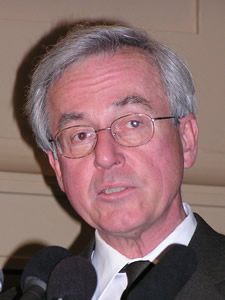April 28, 2005
 |
| "These violent offenders are too dangerous and do not deserve a second opportunity to commit a crime against another victim," said Rep. Steve Smith, R-Mound and chairman of the House Public Safety and Finance Committee. (MPR Photo/Laura McCallum) |
St. Paul, Minn. — Before the House voted 123-to-10 for the bill, much of the seven-hour debate focused on two proposals by first-term Republican Tom Emmer of Delano. One would allow judges to order chemical castration of sex offenders in some cases where the victim is younger than 13. Chemical castration involves taking drugs that suppress sex drive. Emmer argued that some pedophiles can't stop themselves from hurting children.
"This is not punishment. This is rehabilitation. We're trying to help those who can't help themselves," Emmer said.
Emmer's proposal would also allow offenders to voluntarily seek surgical castration. The House voted 80-to-54 for Emmer's amendment, and by a similar margin for his proposal to identify the most dangerous level three sex offenders with special license plates and markings on their drivers' licenses.
Neither of the measures had been debated this session before Emmer brought them up on the floor. Rep. Al Juhnke, DFL-Willmar, says the license plate idea won't work, because sex offenders will find ways to get around the requirement.
"They're not going to drive their car with sexual predator plates to the school and park it so the cop can check on them. These feel-good things; that's really all they are," Juhnke said.
Another Democrat, Ron Latz of St. Louis Park, said marking sex offenders with what amounts to a scarlet letter would set them up for failure in re-entering the community after they've served their prison time.
Rep. Kurt Zellers, R-Maple Grove, responded that the most violent sex offenders can't be rehabilitated.
"We're talking about sick, twisted, perverted minds who prey on not only the ones who are most dearest to us, but the ones who are most vulnerable in our society," he said.
Zellers says those criminals should be locked up for life. Zellers sponsored the part of the bill that would require life sentences without the possibility of parole for rapists who target children, other vulnerable people or use weapons. Prison time for other sex crimes would also increase.
In addition to the sex offender penalties, the bill would spend nearly $1.7 billion to pay for courts and prisons for the next two years. That's an increase of about 16 percent over the current budget. The bill would boost the cost of speeding tickets by $10, and increase a monthly charge on phone connections by 25 cents to pay for 911 service.
The public safety bill moving through the Senate doesn't contain chemical castration or predator plates. It does call for open-ended sentences of up to life in prison for the most dangerous sex offenders.
The bill's sponsor, Minneapolis DFLer Jane Ranum, says the Senate would spend more money than the House on treatment and supervision of offenders once they're released.
"What should shock the public is the fact that we have violent offenders - including some sex offenders - who are on probation caseloads in our community with caseloads of up to 150," according to Ranum.
Ranum wants to pay for probation and other public safety costs with a penny-a-drink increase in the wholesale alcohol tax. But the Senate Taxes Committee voted to remove the drink tax increase from Ranum's bill, leaving the funding for the Senate bill in question.




